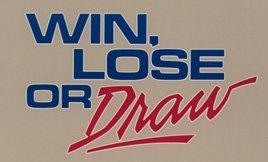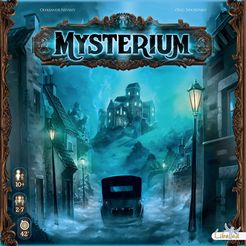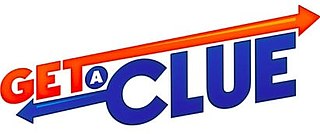Related Research Articles

Charades is a parlor or party word guessing game. Originally, the game was a dramatic form of literary charades: a single person would act out each syllable of a word or phrase in order, followed by the whole phrase together, while the rest of the group guessed. A variant was to have teams who acted scenes out together while the others guessed. Today, it is common to require the actors to mime their hints without using any spoken words, which requires some conventional gestures. Puns and visual puns were and remain common.

Pictionary is a charades-inspired word-guessing game invented by Robert Angel with graphic design by Gary Everson and first published in 1985 by Angel Games Inc. Angel Games licensed Pictionary to Western Publishing. Hasbro purchased the rights in 1994 after acquiring the games business of Western Publishing. Mattel acquired ownership of Pictionary in 2001. The game is played in teams with players trying to identify specific words from their teammates.
Give Us a Clue is a British televised game show version of charades which was broadcast on ITV from 1979 to 1992. The original host was Michael Aspel from 1979 to 1984, followed by Michael Parkinson from 1984 to 1992. The show featured two teams, one captained by Lionel Blair and the other by Una Stubbs. Later versions of the programme had Liza Goddard as captain of the women's team. Norman Vaughan stood in for Blair for a short spell in 1980. Originally, the teams consisted of the captain, two celebrities and one member of the public. The public participation was dropped and another celebrity was added in their place. On one infamous edition of the programme, the male member of the public was handed the title he had to mime on a card by host Michael Aspel, but rather than read the mime, he read the wrong side of the card on which his name was printed. He thus mimed his name to his teammates. Lionel Blair later wrote this incident led to the dropping of the public participants.

Taboo is a word, guessing, and party game published by Parker Brothers in 1989. The objective of the game is for a player to have their partners guess the word on the player's card without using the word itself or five additional words listed on the card.

Win, Lose or Draw is an American television game show that aired from 1987 to 1990 in syndication and on NBC. It was taped at CBS Television City, often in Studios 31, 33, and 43 at various times. It was co-produced by Burt & Bert Productions and Kline & Friends for Disney's Buena Vista Television. It has also had two versions on The Disney Channel: Teen Win, Lose or Draw from 1989 to 1992, and a revived version known as Disney's Win, Lose or Draw which aired in 2014.
Catch Phrase is a word guessing party game commercially available from Hasbro.

Body Language is an American game show produced by Mark Goodson Productions. The show aired on CBS from June 4, 1984, until January 3, 1986, and was hosted by Tom Kennedy. Johnny Olson announced until his death in October 1985; Gene Wood and Bob Hilton shared the announcing duties afterward, and had substituted on occasion before that.
221B Baker Street: The Master Detective Game is a board game featuring Arthur Conan Doyle's fictional detective Sherlock Holmes and developed by Jay Moriarty in 1975 and sold by the John N. Hansen Co. in the US since 1977. The players have to solve cases using the clues provided by visiting locations on the board such as 221B Baker Street, Scotland Yard, Apothecary and Pawn Broker.
The (£1,000) Pyramid Game is a United Kingdom game show based on the American format of the same name that was originally shown on ITV from 1981 to 1984 then 1989 to 1990 hosted by Steve Jones, then revived by Challenge in 2007 hosted by Donny Osmond.
30 Seconds is a South African fast-paced general knowledge game. Players generally play in teams of two to sixteen. One player must guess a word from their teammate's explanation, much like Charades, with the aim to guess as many possible answers in 30 seconds. The main restriction on the explanation is that it may not contain the actual word or part of the word.
Celebrity is a party game similar to Charades, where teams play against each other to guess as many celebrity names as possible before time runs out.

The Big Taboo is a variation on the board game Taboo. It incorporates elements from games like Pictionary, Charades, and 25 Words or Less to create a party game with "a little bit of everything". The game was published in 2008 by Winning Moves Games USA and is no longer in production.
Pyramid is an Australian children's quiz show screening on the Nine Network from 2009-2015 hosted by Shura Taft. It is co-produced by Sony Pictures Television and produced by Sydney-based Ambience Entertainment. It began broadcasting on 1 September 2009 and is filmed in front of a live studio audience. It involves two teams competing in games of "vocal charades". The show is based on the 1979 United States game show The Junior Partner Pyramid, a children's variant of the Sony Pictures Television Pyramid franchise.
Family Game Night was an American television game show based on Hasbro's family of board games and EA's video game franchise of the same name. The show was hosted by Todd Newton. Burton Richardson announced for the first two seasons, until he was replaced by Stacey J. Aswad for the third season, and then Andrew Kishino beginning in the fourth season. The 60-minute program debuted on October 10, 2010, on The Hub, formerly Discovery Kids. The network would become Discovery Family on October 13, 2014; it was previewed on October 9, 2010, on its sister channel, TLC. Seasons 1 and 2 each contained 26(1) and 30(2) episodes. Seasons 3, 4 and 5 each contained 15 episodes. Season two premiered on Friday, September 2, 2011, and additional games were added. The games added to the second season included Cranium Brain Breaks, Green Scream, Ratuki Go-Round, Simon Flash, Operation Sam Dunk, Trouble Pop Quiz, and Spelling Bee. However, games from the previous season were still kept.
The Genius: Rules of the Game is the first season of The Genius debuted on tvN on April 26, 2013.

Codenames is a 2015 card game for 4–8 players designed by Vlaada Chvátil and published by Czech Games Edition. Two teams compete by each having a "spymaster" give one-word clues that can point to multiple words on the board. The other players on the team attempt to guess their team's words while avoiding the words of the other team. In a variant with 2–3 players, one spymaster gives clues to the other player or players. Codenames received positive reviews and won the Spiel des Jahres award for the best board game of the year.

Mysterium is a cooperative board game designed by Oleksandr Nevskiy and Oleg Sidorenko. It blends aspects of murder mystery games and card-based guessing games. One person plays the ghost of a murdered individual who can communicate with the other players only through a series of visions in the form of illustrated cards. The other players, who take the role of psychic mediums, must interpret these cards to identify a suspect, location, and murder weapon.
Just One is a cooperative party game for 3 to 7 players, designed by Ludovic Roudy and Bruno Sautter and published by Repos Production in 2018. In each round of the game, players write down a one word clue for the round's guesser, who must figure out the secret word for the round. Identical clues are discarded before the guesser sees them.

Get a Clue is an American television game show hosted by Rob Belushi and broadcast by Game Show Network. It premiered on January 6, 2020.
References
- ↑ "Board Game Geek".
- ↑ Arneson, Eric. "About.com".
- ↑ Gwinn, Eric (December 10, 2000). "It's All in the Game". Chicago Tribune.
- ↑ San Francisco Chronicle (November 29, 2009). "Our panel plays, grades the board games of 2009".
- ↑ "Board Game Geek".